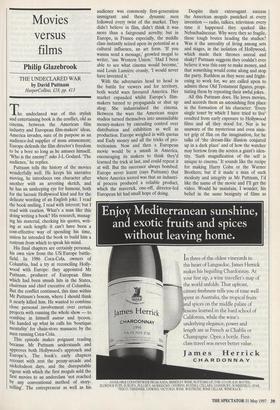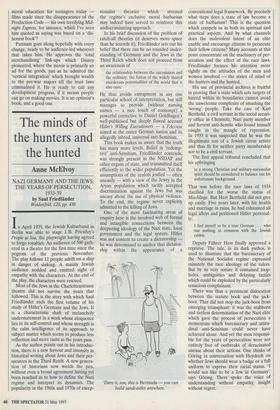Movies versus films
Philip Glazebrook
THE UNDECLARED WAR by David Puttnam HarperCollins, £18, pp. 413 The undeclared war of this stylish and entertaining book is the conflict, old as cinema, between the American film industry and European film-makers' ideas. America invades, sure of its purpose as an audience-led supplier of mass amusement; Europe defends the film director's freedom to be a bore so long as he amuses himself. `Who is the enemy?' asks J-L Godard. 'The audience,' he replies.
Puttnam tells the history of the movies wonderfully well. He keeps his narrative moving, he introduces one character after another with an arresting sketch, and he has an unsleeping eye for humour, both for the laconic Hollywood kind and for the delicate wording of an English joke. I read the book smiling, I read with interest; but I read with caution. What's a man like this doing writing a book? His research, manag- ing his material, checking his quotes, writ- ing at such length: it can't have been a cost-effective way of spending his time, unless he intended the book to build him a rostrum from which to speak his mind.
His final chapters are certainly personal, his own view from the US/ Europe battle- field. In 1986 Coca-Cola, owners of Columbia, had a try at reconciling Holly- wood with Europe: they appointed Mr Puttnam, producer of European films which had been smash hits in the States, chairman and chief executive of Columbia. But the conflict continued, this time within Mr Puttnam's bosom, where I should think it nearly killed him. He wanted to combine close personal involvement over certain projects with running the whole show — to combine in himself auteur and tycoon. He handed up what he calls his 'boutique mentality' for chain-store massacre by the men running Coca-Cola.
This episode makes poignant reading because Mr Puttnam understands and approves both Hollywood's approach and Europe's. The book's early chapters recount with zest the penny-arcade and nickelodeon days, and the disreputable vigour with which the first moguls sold the first movies to an underclass 'not reached by any conventional method of story- telling'. The entrepreneur as well as his audience was commonly first-generation immigrant and these dynamic men followed every twist of the market. They didn't believe in film, didn't think it was more than a fairground novelty; but in Europe, in France especially, the middle class instantly seized upon its potential as a cultural influence, an art form. 'If you wanna send a message,' growled mogul to writer, 'use Western Union.' Had I been able to see what cinema would become,' said Louis Lumiere crossly, 'I would never have invented it.'
With the adversaries head to head in the battle for viewers and for territory, both world wars favoured America. Her market expanded whilst Europe's film- makers turned to propaganda or shut up shop. She industrialised the cinema. Between the wars the American major studios turned themselves into unassailable money-makers by extending control over distribution and exhibition as well as production. Europe weighed in with quotas and Eady money and all the tricks of pro- tectionism. Now and then a European movie would be a smash in America, encouraging its makers to think they'd learned the trick at last, and could repeat it at will. But the successor always bombed: Europe never learnt (says Puttnam) that where America scored was that an industri- al process produced a reliable product, which the maverick, one-off, director-led European hit had small hope of doing. Despite their extravagant success the American moguls panicked at every invention — radio, talkies, television: every time it happened they quaked like Nebuchadnezzar. Why were they so fragile, these tough brutes heading the studios? Was it the unreality of living among sets and stages, in the isolation of Hollywood, which made their thrones unreal and shaky? Puttnam suggests they couldn't ever believe it was this easy to make money, and that something would come along and stop the party. Ruthless as they were and fright- ening to work for, we are called upon to admire these Old Testament figures, propi- tiating them by repeating their awful jokes.
All this Puttnam does. He loves movies, and accords them an astonishing first place in the formation of his character: 'Every single tenet by which I have tried to live' resulted from early exposure to Hollywood films and all they stood for. Nor is he unaware of the mysterious and even sinis- ter grip of film on the imagination, for he talks of 'the dream-like illusion conjured up in a dark place' and of how the watcher may borrow from the screen a giant's iden- tity. 'Such magnification of the self is unique to cinema.' It sounds like the recipe for making Harry Cohn or the Warner Brothers; but if it made a man of such modesty and integrity as Mr Puttnam, I'd like the name of the movie and I'll get the video. Would he maintain, I wonder, his belief in the same benignity of films as moral education for teenagers today films made since the disappearance of the Production Code — his own terrifying Mid- night Express, for instance, which I've seen him quoted as saying was based on a 'dis- honest book'?
Puttnam goes along hopefully with every change, ready to be audience-led wherever that takes him. He approves the 'total merchandising' link-ups which Disney pioneered, where the movie is primarily an ad for the goods, just as he admired the `vertical integration' which brought wealth to the pre-war majors till the trust laws criminalised it. He is ready to call any development progress, if it means people can go on making movies. It is an optimist's book, and a good one.



































































 Previous page
Previous page